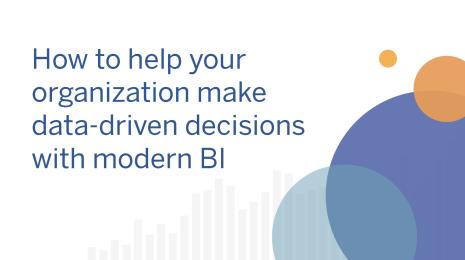Why comprehensive data management is key to AI success

Originally published on CIO.com .
Organizational leaders have widely recognized the promise of AI as the cornerstone of digital transformation and it’s no surprise that many are now attempting to accelerate its deployment and adoption.
However, most of these same organizations are still struggling to increase adoption and interest in analytics. Even with the emergence of business intelligence (BI) platforms, promises of better decision-making can go unfulfilled without widespread adoption.
For an organization to have any chance at success with AI, it must first have a solid BI strategy rooted in the core pillars of people, process, and platform. In recent years, many organizations have moved beyond basic descriptive analytics and into more diagnostic analysis, but few have created a true self-service environment capable of embracing the benefits and risks of AI.
Without this foundation in place, efforts to fast track an AI deployment could ultimately lead to negative outcomes like incorrect decisions resulting in lost revenue opportunities, penalties, or even long-term damage to an organization’s reputation. To avoid common pitfalls, organizations seeking to bolster investments in AI and accelerate its adoption should first assess the current state and foundational stability of their BI program.
AI is a high stakes game
Relative to BI, the stakes associated with AI are exponentially higher. BI is largely focused on understanding what has already happened, primarily via key performance indicators (KPIs), while the benefits of AI and machine learning reside in what they can offer in higher value predictive and prescriptive analytics.
As is often the case, the higher the potential reward, the greater the risk. Erroneously reporting a KPI via a report or dashboard would likely not be viewed as a catastrophic event, but the same would not be true if a critical business decision was ill-informed by a poorly trained algorithm.
Data is the foundation of an AI system. Therefore, the quality and reliability of AI-enabled prescriptive recommendations or automated tasks are directly correlated to the quality and reliability of the data used to train the system. Organizations that have not invested in sound data management practices or have struggled to build traction and confidence in their BI deployment stand little chance of successfully embracing AI.
Analytic adoption is nascent
Many organizations have invested in and implemented sound data management techniques. But organizations can only advance in analytic maturity if employees analyze the data and use the resulting insights for decision making.
Unfortunately, BI adoption has been consistently low since its inception with a relatively small percentage of organizations’ users actually embracing BI and analytic capabilities. While the BI market is shifting towards a modern self-service model, extending analytical capabilities to a broader audience, most organizations are still in the infancy of overall analytic maturity. This is largely due to the time and complexity associated with creating a true culture of analytics.
For most companies, trying to leap from a state of low maturity to an AI-focused model is simply too wide of a gulf to successfully cross. An organization’s users will ultimately train an AI system, so they must first have a vested interest in the outputs along with the aptitude and competence to properly manage the inputs. When they start increasing their data literacy levels by asking better questions and exploring new datasets, their need for more advanced analytic capabilities often follow in tandem. This fosters an environment where an AI implementation can thrive.
BI champions will be AI champions
The extent to which AI will succeed within an organization ultimately comes down to the decision makers. If organizational decision-makers favor instinct over data, there is little chance that they would be willing to trust machine-generated insights and recommendations. In the face of business process decisions, a leader who has never embraced a data-driven mindset will likely reject any “black box” AI solution and revert to instinct.
In order to build a successful AI implementation, decision makers must address the underlying issues contributing to reluctant BI adoption. This begins with an honest assessment of an organization’s data assets to determine if they are suitable to serve as an input into algorithms that power AI. A comprehensive data strategy should be developed and utilized to address any gaps or weaknesses in the areas of data governance, quality, cleansing, cataloging, security, or metadata management that surface during this assessment.
While your organization is building this foundation, determine if there are departments or teams that have already established a solid BI program or developed robust analytic processes that drive their decision processes. In these cases, it is a natural step to evaluate AI to further optimize decision making. These teams can serve as a blueprint for other areas of an organization as they make steps towards analytic maturity.
相关故事
Subscribe to our blog
在您的收件箱中获取最新的 Tableau 更新。








